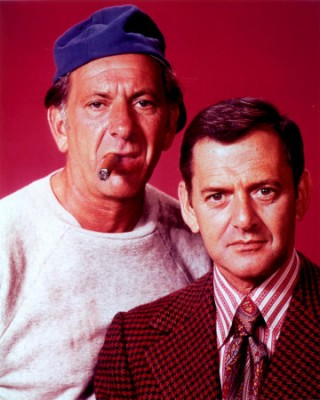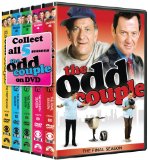| Reviews & Columns |
|
Reviews DVD TV on DVD Blu-ray 4K UHD International DVDs In Theaters Reviews by Studio Video Games Features Collector Series DVDs Easter Egg Database Interviews DVD Talk Radio Feature Articles Columns Anime Talk DVD Savant Horror DVDs The M.O.D. Squad Art House HD Talk Silent DVD
|
DVD Talk Forum |
|
|
| Resources |
|
DVD Price Search Customer Service #'s RCE Info Links |
|
Columns
|
|
|
Odd Couple - The Complete Series, Seasons 1-5, The
That's still a lot of money to plunk down for one show, though as I've pointed out (without much success) to the wife, at 114 episodes that comes out to about $1.05 per episode. She's not buying that argument.
The series, adapted from Neil Simon's seminal 1965 Broadway play (and the successful 1968 film, which like the TV show was produced by Paramount Pictures), is one of the best situation comedies of the 1970s, though it's not as well-remembered or respected as, say, Mary Tyler Moore or M*A*S*H. Partly this is due to the fact The Odd Couple ran on ABC when that network ran a distant third in the ratings. Virtually all the best sitcoms of the era, including All in the Family, Maude, The Bob Newhart Show, WKRP in Cincinnati, Mary Tyler Moore, and M*A*S*H were on CBS.
Garry Marshall and his then-writing partner Jerry Belson, who first hit it big as major contributors to The Dick Van Dyke Show, developed The Odd Couple for television and Marshall ended up executive-producing it as well. The series was never a ratings blockbuster, but toward the end of The Odd Couple's run Marshall brought American Graffiti to the small screen in all but name. Happy Days marked the sudden shift in the ratings away from CBS and to ABC, where the much less-sophisticated slapstick of Marshall's later three-camera shows, including Laverne & Shriley and Mork & Mindy, changed the face of the American sitcom yet again, until Cheers, on NBC, moved it in yet another direction.
The play The Odd Couple is much like Hamlet or Sherlock Holmes in any media. It's practically fool-proof, pliable to myriad interpretations of its two central characters, easy to stage and even high school productions can be pretty funny.* The original Broadway version starred Walter Matthau as Oscar Madison, a divorced sportswriter and incorrigible slob, and Art Carney as neurotic, newly-separated Felix Unger, an obsessive neat-freak. Though it's hard for many to imagine Carney, TV's iconic sewer worker Ed Norton (from The Honeymooners) as fussy Felix, the actor probably was deliberately trying to break away from that deeply-engrained public image, and by all accounts Carney in real life was a lot closer to Felix's psyche than Ed Norton's. According to Jane Kean, Carney's co-star on The Jackie Gleason Show, as in the play Walter Matthau literally drove Carney nuts. Apparently the recovering alcoholic fell off the wagon and despite the play's success ended up in a mental hospital for a time.
For the 1968 film version, Carney was replaced with Jack Lemmon, who had memorably teamed with Matthau for the first of about a dozen times in Billy Wilder's The Fortune Cookie (1966). In those two films Matthau created a new screen persona that made him an unlikely movie star. After years of mostly playing villains, nearly all of Matthau's subsequent work would be in varying combinations and variations of those two characters. Lemmon's Felix, on the other hand, was low-key and clinically psychological. It wasn't all that funny, kind of a very slightly darker version of Lemmon's own established screen persona, one he'd fine-tune and continuing darkening and layering over the next 15 years, in films like Avanti! and The China Syndrome.
The Odd Couple TV series starred Jack Klugman, who replaced Matthau on the stage, as Oscar, and Tony Randall as Felix. Both had enjoyed successful careers on the stage, with Klugman a much-in-demand character actor for TV anthology shows of the '50s and '60s, while Randall became a character star in the movies during that same period.
As stated in my review of Time-Life's release of season one, though Randall initially lobbied for Mickey Rooney to play Oscar, the teaming with Klugman proved fortuitous. They have superb chemistry, and both it and the show only got better with time.
Perhaps the main reason the show got better was a radical decision, again with Randall's lobbying, to abandon the one-camera filmed-like-a-movie production method used for the first season (in an obvious attempt to emulate the look of the 1968 film) to a three-camera, live-before-a-studio-audience performance style implemented from the second season forward. Of course, this meant that the actors could feed off audience reactions much like the original play. And, interestingly, watching the series again for the first time in years, I was surprised by the degree in which the teleplays are structured to accommodate a "live performance," versus the usual sitcom.
Today, it's not uncommon in sitcoms to have filmed-on-the-backlot inserts, numerous sets and costume changes, and the stars of these shows more often than not are playing to the camera rather than the audience before them, and many develop their performance through multiple takes and blown lines. In the old days of The Odd Couple, The Bob Newhart Show and Here's Lucy, the actual filming of a half-hour sitcom wasn't much longer than the show itself; the whole thing would be in the can in less than an hour, but today a 22-minute sitcom often takes hours to film, with studio audience members sometimes held like hostages until late in the evening.
Clearly, Klugman and especially Randall loved performing live. Once The Odd Couple became a three camera/studio audience sitcom, Randall's Felix suddenly became memorable: manic, obsessive-compulsive, cheerfully pushy and snobbish, blithely unaware of how annoying he is to everyone around him, Felix is recognizable as that supreme pest of a friend we can't live without, even as he drives us to the brink of homicide.
In his TV anthology days, Klugman specialized in loser everyman types, and his Oscar is a kind of offshoot of that character, the breezy gambler who loses his paycheck at the track, who doesn't worry about impressing others or even care about his personal appearance. But Klugman will also reach back to his anthology days exploding with anger at the major league headaches Felix creates for him, like embarrassing him on the witness stand in court, on the game show Password, or as an actor in what turns out to be a skin flick.
As for specifics about the series, following colleague Paul Mavis and his reviews are like trying to follow Jolson; there's little that I can add to what he says here, here, here, here, and here.
Video & Audio
Warning: The Odd Couple on DVD is cut: In about .01 type font on the back of each DVD case, there's a warning stating "Music has been changed for this home entertainment version." Well, not so much changed as hacked out with all the subtlety of a Tex Avery-imagined meat cleaver. My memory is that on the plurality of shows, Randall's Felix frequently would break into popular song, usually something by Berlin, Gershwin, or Cole Porter, or maybe a line or two from a popular Broadway musical. This sort of thing was legally cleared for network broadcast and syndication, but presumably not for home video.
Unfortunately, the cost of licensing music is ludicrously expensive. A few years ago some friends of mine produced a feature film for about a million dollars, and wanted to use a Frank Sinatra song under its opening titles. They were disheartened to learn its owners wanted nearly as much money for the use of the song as it had cost to make the entire film. So while it's easy to assume (and, as Felix says, "When you assume you make an 'ass' out of 'u' and 'me!'") Paramount is simply being cheap, licensing everything needing clearances might easily run into millions of dollars, many times more than something like this is expected to gross, let along earn.
That doesn't help the DVDs, however. Though it's not in every episode, when a few lines from a song are chopped out the jump-cutting occasionally takes on an Ed Wood-like surrealism, with the actors suddenly popping from one side of the stage to the other, or there will be an abrupt fade-out in the middle of a line. The effect is rather like watching reruns on UHF, when local stations would indiscriminately hack shows to pieces in order to make room for more commercials.
In the end, Randall and Klugman win out; their performances are damaged but not ruined by this unfortunate practice. The shows themselves otherwise look great, with bright color, and a sharp image the likes of which are far removed from those same UHF rerun days. The discs are English mono only with no subtitle options.
Extra Features
The set has the same First Season extras originally done for the Time-Life release, but that's it, there's nothing at all on the later season shows, which is a shame, given that the series only got better as it went along.
Parting Thoughts
The butchering of numerous episodes because of music rights issues is extremely unfortunate, but in this day and age there may be no other reasonable, viable option, which is a pity. But the brilliant performances of Klugman and especially Randall still shine through such indignities, and this is a great sitcom waiting to be rediscovered and reappraised. Recommended.
* This reviewer even appeared as Murray the Cop in a stage production, though mine was more Herb Edelman-esque than Al Molinaroian.
Film historian Stuart Galbraith IV's latest book, The Toho Studios Story, is on sale now.
|
| Popular Reviews |
| Sponsored Links |
|
|
| Sponsored Links |
|
|
| Release List | Reviews | Shop | Newsletter | Forum | DVD Giveaways | Blu-Ray | Advertise |
|
Copyright 2024 DVDTalk.com All Rights Reserved. Legal Info, Privacy Policy, Terms of Use,
Manage Preferences,
Your Privacy Choices | |||||||














